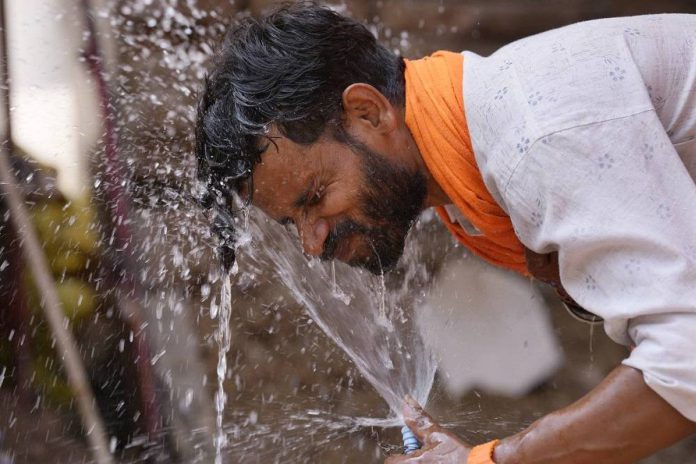Of late, India has found itself in the grips of an unprecedented heatwave that has left the nation reeling. As the mercury soars to record-breaking levels, the country faces a harrowing reality – a future where the very limits of human endurance are put to the test. This scorching saga serves as a stark warning, not just for India, but for the world at large, as the devastating effects of climate change become increasingly undeniable.
Delhi’s inferno reaches a crescendo
Never a city that’s kind in the summer, Delhi’s heat has become even more oppressive of late, almost searing the lungs, with heat seeping into the bones. As temperatures soar past the 50°C mark, the nation’s capital has become a veritable furnace, testing the mettle of its resilient inhabitants.
It’s a scene straight out of a dystopian novel – the iconic India Gate, usually a bustling hub of activity, stood in eerie silence when this writer swung by, its grandeur overshadowed by the relentless onslaught of the sun. The city’s iconic landmarks, once a source of pride, have become silent witnesses to the unfolding drama, as the thermometer continues to defy its own limits.
But Delhi’s woes aren’t limited to the scorching temperatures alone. The city’s notorious humidity adds an extra layer of peril, making the already unbearable conditions downright life-threatening. As sweat refuses to evaporate, the body’s natural cooling mechanisms are rendered ineffective, leaving residents grasping for relief that seems perpetually out of reach.
The urban heat island effect
The urban heat island effect, a phenomenon where cities become significantly warmer than their surrounding rural areas, has exacerbated the crisis in Delhi. The city’s sprawling concrete jungle, coupled with the lack of adequate greenery, has created a veritable oven, trapping heat and making it increasingly difficult for residents to find respite.
While Delhi may be the epicenter, the heatwave’s tentacles have spread far and wide, enveloping vast swathes of the country in its scorching embrace. From the arid deserts of Rajasthan to the lush green hills of the Northeast, the entire nation has been forced to confront the harsh realities of a planet in flux.
Rajasthan, known for its vibrant culture and stunning landscapes, has become a battleground against the relentless onslaught of the sun. The state’s cities, once bustling with life, now resemble ghost towns, as residents seek refuge from the punishing heat, retreating behind closed doors and drawn curtains.
Even the verdant Northeast, traditionally known for its temperate climate, has not been spared. The region’s delicate ecosystems, once a haven for biodiversity, now struggle to cope with the unprecedented rise in temperatures, as the fragile balance of nature is disrupted.
Cascading consequences: Health, livelihoods, and infrastructure
The heatwave’s impact extends far beyond the immediate discomfort of scorching temperatures. It has wreaked havoc on the nation’s health, with a surge in heat-related illnesses and fatalities. Outdoor workers, the elderly, and the underprivileged have borne the brunt of this crisis, as their livelihoods and well-being hang precariously in the balance.
Moreover, the strain on the country’s infrastructure has been immense. Power grids, already stretched to their limits, have been pushed to the brink, as the demand for air conditioning and cooling systems skyrockets. The spectre of widespread blackouts looms large, further exacerbating the already dire situation.
A global wakeup call: Lessons for the world
As India grapples with the devastating consequences of this heatwave, the world watches with a mixture of empathy and trepidation. This crisis serves as a stark reminder that the effects of climate change know no borders, and that the time for action is now.
Countries around the globe must heed the lessons learned from India’s ordeal and take proactive steps to fortify their own defenses against the onslaught of extreme heat. Robust heatwave preparedness plans, comprehensive public awareness campaigns, and strategic investments in climate-resilient infrastructure must be prioritized.
Tackling the root cause: Accelerating the transition to renewable energy
Ultimately, the solution to the global heatwave crisis lies in addressing the root cause – the relentless burning of fossil fuels and the resulting greenhouse gas emissions. Countries around the world must accelerate their transition to renewable energy sources, embracing innovative technologies and policy frameworks that can drive the shift towards a sustainable future.
A clarion call for global climate action
The heatwave engulfing India is not just a local crisis; it is a harbinger of a global reckoning. As the planet’s temperature continues to rise, the world must heed the warning signs and take decisive action to safeguard the future of humanity and the planet we call home.
From equipping vulnerable populations with the knowledge and resources to cope with extreme heat to investing in early warning systems and emergency response protocols, the path forward demands a comprehensive, multi-faceted approach. By empowering communities and prioritizing the protection of lives, we can ensure that the devastating toll of heatwaves is reduced, and resilience becomes the cornerstone of our collective future.
Ultimately, no nation can tackle the climate crisis alone. Forging global partnerships, sharing best practices, and coordinating international efforts are crucial to driving the systemic change required to mitigate the effects of climate change. Only through a unified, global response can we hope to overcome the daunting challenges that lie ahead.
As well, while governments and global institutions play a pivotal role, the responsibility for climate action extends to each and every one of us. By making sustainable lifestyle choices, advocating for policy change, and inspiring our communities to embrace environmentally conscious practices, we can all contribute to the collective fight against the looming climate catastrophe that promises to engulf us all.


